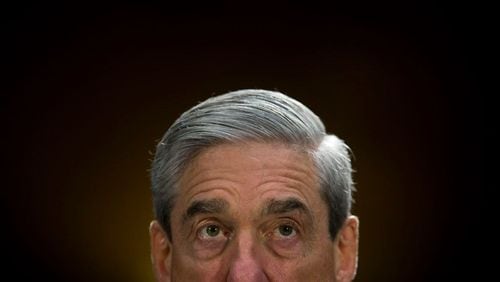When Donald Trump is scared, all the bluster in the world can’t disguise his fright. And it has become pretty clear that the three things that scare Trump the most are Robert Mueller, Vladimir Putin and telling the truth.
For the moment, let’s set aside the mysterious intimidation that Putin wreaks on Trump, reducing the American president to a quivering, eager-to-please kiss-up whenever Trump is in his presence. Instead, let’s concentrate on Trump’s aversion to Mueller and the truth, because those two fears are closely intertwined.
Trump fears sitting down before the special counsel because he knows he would be stripped of his greatest defense mechanisms. He can’t lie, he can’t invent, he can’t weave a fantasy reality out of malarkey and moonbeams and try to sell it as factual. Mueller is not a Trump rally crowd, eager and willing to swallow any nonsense their hero feeds them. He is not a “Fox & Friends” host, kowtowing to their greatest ratings draw. Before Mueller, Trump would have to tell the truth, the whole truth and nothing but the truth.
That’s why Trump and his legal team are refusing to allow that testimony to take place. They realize the disaster that would ensue if Trump is put in that situation.
Of course, that’s not how they’re trying to spin it. Their strategy to keep Trump from having to testify in the Russia probe has three basic components:
1.) They complain that Mueller is trying to set something called a “perjury trap” for the president, which is basically their way of admitting that if put under oath and asked questions about Russia, their client would probably lie. The truth ought to be your friend in such a situation: If you tell the truth, you cannot commit perjury. But based on their reaction, telling the truth would not be an option for Trump.
2.) Trump’s team says they will agree to an interview, but only if Mueller agrees to ask just those questions that they allow him to ask, only on topics that they handpick, and only in the form that they allow him to put them. Basically, the ground rules that they want Mueller to accept would limit the prosecutor to questions of the sort that Trump fields from Sean Hannity.
Mueller is unlikely to accept those limitations, and Trump’s legal team knows it.
So where do we go from here?
It’s possible — though I think unlikely — that Mueller doesn’t really need Trump’s testimony, that his requests for an interview with the president have been an effort to demonstrate openness to his input. If that’s the case, Mueller will now continue with his investigation, issuing indictments and subpoenas as needed, and eventually produce a report on what he has found.
But if Mueller does need Trump’s testimony, if he believes that Trump witnessed and did things during the campaign and as president that he needs to explain, things get difficult. Mueller would then be forced to issue a subpoena against Trump, requiring him to testify or claim the Fifth, and that’s where his defense team’s third strategy comes into play.
Trump and his lawyers, including Rudy Giuliani, claim that a sitting president cannot be indicted or subpoenaed. They’re probably right about an indictment, but probably wrong about a subpoena. As one notable attorney put it a few years back, if a president is subpoenaed to testify, “You gotta do it. I mean you don’t have a choice … the president should be treated — as far as the criminal law is concerned, the president is a citizen.”
That attorney was of course Giuliani; the year was 1998.
About the Author






